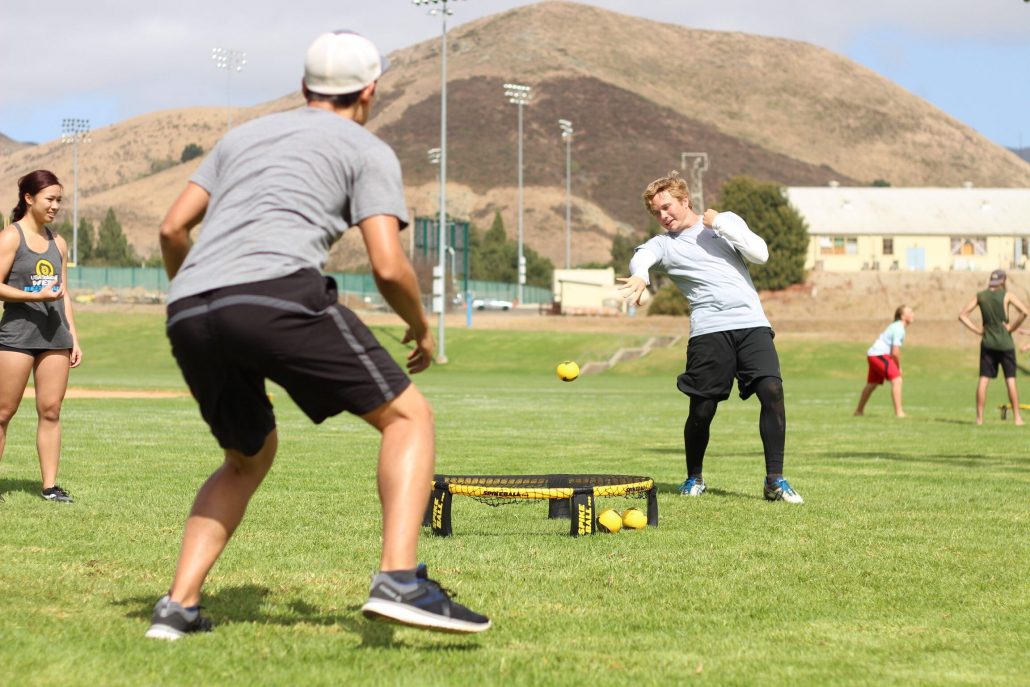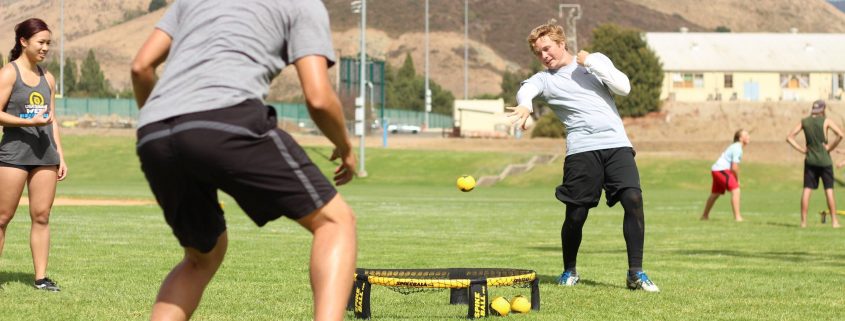Roundnet on the rise: USC’s unofficial spikeball team is part of a growing movement

Passersby don’t tend to equate it with Saturday night football at the Coliseum, but the Spikeball nets set up on the Great Lawn at USC Village each Friday are not simply part of some big party game.
SC Spikeball Roundnet Club has developed both a social and competitive roundnet scene at USC where first-time players can compete against the University’s best.
Tucker Judkins and Tavis Cote, juniors majoring in journalism and political science with a progressive degree in communication management, respectively, started the club in 2017 to bring together USC students with an interest in roundnet.
“It doesn’t matter if you’re super good, super bad, if you’ve never played before, whatever,” Judkins said. “Everyone just goes and plays.”
Spikeball Roundnet Club meets Friday afternoons from 2 to 6 p.m., although Judkins said those interested in playing competitively stay as late as 11 p.m. and show up to the Great Lawn Tuesdays and Saturdays as well.
“We run drills first for half an hour to 45 minutes, and then we play two hours of games,” Judkins said of the competitive practices. “And then there’s a bunch of tournaments throughout the two semesters as well.”
Roundnet — better known as Spikeball, after the company that manufactures the signature nets and balls — has taken off in the last few years, garnering $6.9 million in 2015 alone. The competitive scene has also skyrocketed to include over 4 million players worldwide.
The sport borrows elements from volleyball, four square and handball. Two teams of two volley the ball to their partners and spike the ball onto the net, attempting to keep opponents from returning it.
Although the Spikeball product was initially marketed as a toy when it was introduced in 1989, roundnet has become a serious sport with a large competitive scene that has struggled to gain exposure. Spikeball creator Chris Ruder severed ties with “Shark Tank” investor Daymond John because John wanted to partner with Marvel to create a Spiderman-branded set, which Ruder believed would undermine roundnet’s status as a sport.
Many players — Judkins included — were first introduced to roundnet as a game rather than a competitive sport.
“I was on a road trip with some friends … and [my friend’s] mom bought him a Spikeball set, and so we just took it with us,” Judkins said. “We didn’t know the rules, we didn’t know what we were doing and we didn’t have enough people to play. And so we were just hitting this ball on the net and just trying to keep it going, and we just thought it was so much fun.”
Because roundnet’s competitive scene is still relatively small, Judkins said opposing teams constantly tell each other how to get better in order to improve the entire playing field.
“If I was playing baseball … and I fielded a ground ball wrong, if my opponent sees I did that, they’re going to laugh because they’re not trying to help me get better. They want to beat me,” Judkins said. “In Spikeball, in order for the sport itself to actually grow, everybody collectively has to get better so that we can get more exposure as people become better athletes … Everybody just picks each other up and teaches each other on the go.”
Unlike in most sports, roundnet teams do not have formal coaches. As one of USC’s more experienced players, Judkins takes on that coaching role, teaching others the correct form and technique.
Roundnet is expanding not just across college campuses but around the world. In September 2020, Belgium will host the Spikeball Roundnet World Championship, an international tournament that will include both an individual team and a national team championship.
The individual team competition consists of teams of two players representing the same country and will include divisions for different levels of player — advanced, intermediate, beginner and women’s divisions.
In the national team competition, squads composed of the top five men’s and top three women’s teams in each country will compete, and the winner will be determined based on the squad’s overall performance.
Judkins will apply to compete in Belgium within the next few months. Anthony Winney, a freshman majoring in mathematics, is also looking to compete and may apply to play alongside Judkins.
Although the international tournament setting is new, players have been competing in roundnet at the national level for years. Judkins has traveled as far as Dallas and Salt Lake City for tournaments.
While the opportunity to compete is certainly enticing to players, the gameplay itself isn’t what keeps players coming back for more.
“Roundnet seems to attract people who [are] extremely genuine individuals and people who are really willing to make themselves vulnerable, and they’re down to earth,” Judkins said. “I’ve found a lot of people like that in the roundnet community, and that’s one of the things I really love about roundnet.”
Unlike many college sports in which players strictly compete against other colleges, members of SC Spikeball Roundnet Club compete both against and alongside players from other schools, creating a tight-knit community of players that extends beyond campus boundaries.
As roundnet continues to pick up speed both nationally and internationally, the future of the sport is unclear — raising the question of whether it could become a Division I sport or even an Olympic sport at some point.
“I think that roundnet could end up in the Olympics, legitimately,” Judkins said. “I think that’s a goal that a lot of people in the roundnet community have. I’m not really sure if there’s a better end goal for a sport than reaching the Olympics, so that’s what I would hope for.”

